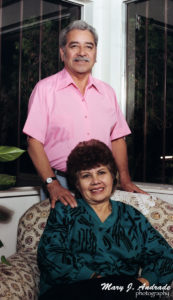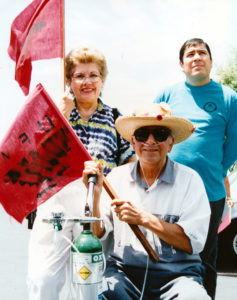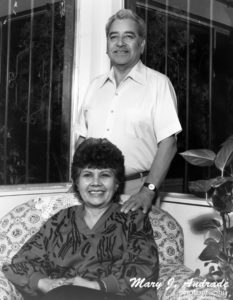 Phillip Márquez fue conocido por su deseo de ayudar particularmente a las personas de origen humilde, pobres y sin preparación para ganarse la vida con un trabajo seguro.
Phillip Márquez fue conocido por su deseo de ayudar particularmente a las personas de origen humilde, pobres y sin preparación para ganarse la vida con un trabajo seguro.
Él nació el 25 de mayo de 1930 en Corvallis, Montana. A la edad de 15 años fue a Madera a trabajar en un rancho donde contrajo neumonía, cuando el capataz no le permitió a él y a otros trabajadores protegerse de la lluvia.
En 1954 y ya casado con Florence, decidió venir a radicarse en San José, trabajando en un comienzo en una fábrica enlatadora de frutas y vegetales y luego en la planta ensambladora de carros de la compañía Ford en Milpitas.
Debido a los rezagos de la neumonía que contrajo en Madera y temiendo que el olor de los químicos en la Ford afectara sus pulmones, decidió ir a trabajar en el Servicio Postal donde comenzó en 1957. Él repartía la correspondencia desde la Estación D, localizada en la Avenida Jackson, cerca de la Avenida Alum Rock.
En 1974, Phillip Márquez fue parte de una docena de personas que recibieron instrucción especial para convertirse en diáconos, para servir en áreas de mayor concentración de ciudadanos hispanos. Se inició en Nuestra Señora de Guadalupe, celebrando matrimonios, bautizos, rosarios y funerales.
El matrimonio Márquez perdió un hijo, quien falleció de cáncer. Al experimentar ese dolor tan profundo, decidió aumentar sus horas de dedicación a la comunidad aceptando celebrar un mayor número de servicios religiosos de rosarios y funerales. También dedicó su tiempo voluntariamente, dando apoyo y consuelo en el Center for Living and Dying.
Uno de los momentos de mayor satisfacción para Phillip Márquez fue el día, que recibió su título en Honorary Associate’s degree en el San José City College, en 1979. Su educación formal se interrumpió en el octavo grado, obteniendo su diploma de escuela secundaria cuando tenía 37 años de edad.
Su título honorario fue un reconocimiento a su servicio y entrega a la comunidad.
Vivió con su familia en el Este de San José, donde fue cartero por 30 años. En su actividad religiosa sirvió como diácono por más de 17 años en las Iglesias de Nuestra Señora de Guadalupe y la Santísima Trinidad, sirviendo también en el Comité del Centro para Entrenamiento de Trabajos (CET).

Su contacto diario con la gente le ayudó a dirigir muchos de ellos en sus deseos de superación, reclutándolos para que recibieran instrucción en el Centro de Entrenamiento para Empleos, del cual fue vicepresidente por siete años, de los diez que fue parte de la Mesa de Directores.
A pesar de haber sido diagnosticado con cáncer y del decaimiento ocasionado por su enfermedad, continuó su trabajo en la Iglesia de la Santísima Trinidad, a la vez que participaba, cuando su condición se lo permitía en manifestaciones de apoyo a los trabajadores del campo. En el verano de 1992, tuve la suerte de volver a conversar con él durante una de las manifestaciones organizadas por United Farm Workers, que contó con la presencia de César Chávez. Phillip, acompañado de su esposa Florence, hizo acto de presencia para solidarizar su apoyo a las solicitudes de los campesinos.
Phillip Márquez se mantuvo activo por muchos años en el Programa Misionero Latinoamericano, que fue un programa dirigido a los trabajadores del campo; participó en los Cursillos de Cristiandad, preparando líderes que hablaban español; colaboró con el Centro de Oportunidades del East Valley y el Centro del Lado Este de Caridades Católicas y de Oportunidades de Industrialización. También trabajó con el Concilio para los Hispanos Parlantes del Condado de Santa Clara, la Confederación de la Raza, y muchas otras organizaciones y comités de la comunidad.
Entre 1987 y 1988 sirvió en el Gran Jurado del Condado de Santa Clara y recibió, por parte de C.S.O. un premio de reconocimiento a su labor.
Los esposos Márquez procrearon dos hijas: Rebeca Márquez de San José, Bárbara Márquez de Sacramento y a dos hijos Phillip V. Márquez Jr. y Ernest J. Márquez, ambos residentes en San José. © La Oferta Newspaper.
<English version>

Phil Márquez was born May 25, 1930 in Corvallis, Montana. His town was that of farm workers, his family had 12 members. At age 15 he moved to Texas, working as a migrant farm worker from Texas to Minnesota until he hurt his back. When they moved to California, he worked with Cesar Chavez in weekend’s workshops, and taught to him, “If you can do it, I can do it. God’s on your side.” One day he gave his last $5.00 to the church collection, believing that somehow God would take care of him. The next day he was called to become a Post Office carrier working in the King and Story Road “Sal si Puedes” area delivering mail for 27 years. “You get to know people’s needs over that period of time.”
As an ordained Deacon, he at first was given the cemetery ministry. “I asked myself, what type of memories do we leave behind; that’s what is important in life, no how much money you make.”
He did voluntary work on weekends at Alexian Hospital helping people who were there because their loved one died and the doctor walked away after announcing the death.
In 1977 at C.S.O.’s 25th anniversary of founding he was given an award for his “unselfish devotion and distinguished service to the community.” On May 31, 1979, he received the honorary La Causa Degree from San José City College, given to him by Theodoro I. Morgia, president, for his community work. In 1985 he became a member of the Center for Living and Dying with his wife Florence. He retired January 30, 1987 with some ambitious goals to fix up his home, organize the Hispanics in the church and to have a part in the decision-making policy. “We’re just beginning to do something. Through all of this is the gift of growth.”
He was a member of the Latin-American Missionary program, of the East Valley Opportunity Center, Eastside Center for Catholic Charities, Board member of the Opportunities Industrialization Center, Council of Spanish speaking people of Santa Clara County, Parish Council of Our Lady of Guadalupe, delegate for Santa Clara County for Confederación de la Raza Unida, Santa Clara County Human Development. For Phil the 1977 award and the 1979 honorary degree were major highlights of his life.
Florence Marques was born February 8, 1931, her maiden name was Marmolejo, met her husband Phil in Madera, California. They had five children, and during the early years of her marriage, she gave complete devotion to the family life, until the time came she was forced to go to school and fight for her children rights, which involved pressing for desegregation.
She also became a member of the bilingual Education Committee member of the Mt. Pleasant School Board started in 1977, and was Vice-President of the Comisión de Español for the Diocese to implement the process of education. In 1984 she was part of the delegation to Washington D.C. for the “Tercer Encuentro”, some of the aims being to study and discuss about finding solutions for the Hispanics in the nation. This led to the formation of local committees in which social justice evangelization, leadership, and youth were to be the channels for implementation.
She developed some disenchantment with this particular committee so left it and instead became involved with her husband Phil in the Center for Living and Dying because of their son’s untimely death. She and Phil were available day or night, any time to go to people who faced these live crisis, giving them moral support, particularly in the death occurs within a family. “I am proud to have worked with my husband in the organizing of the Hispanics in the Church in order for us to have a part in the decision making policy. I feel that this makes the whole process richer, and that my personal experiences tell me that hispanos need hispanos.” © La Oferta Newspaper.






